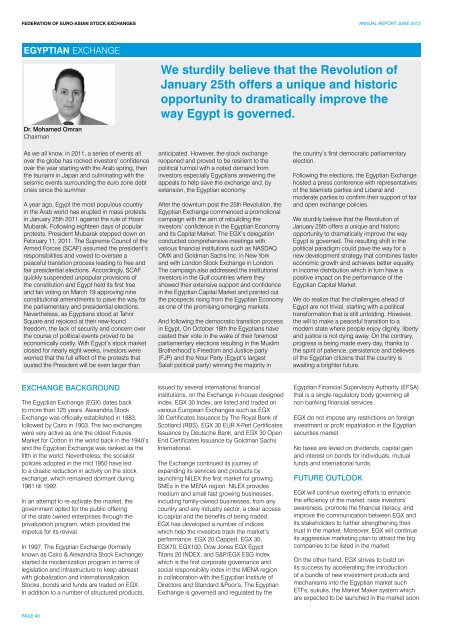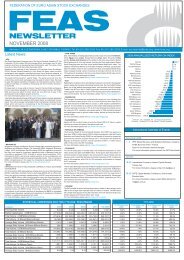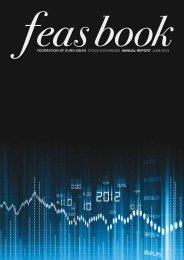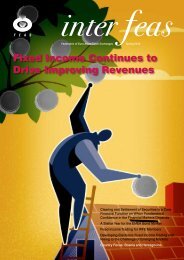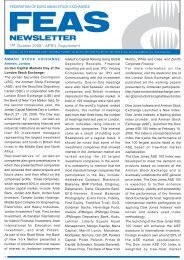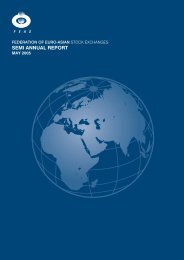JUNE 2013 - FEAS
JUNE 2013 - FEAS
JUNE 2013 - FEAS
- No tags were found...
You also want an ePaper? Increase the reach of your titles
YUMPU automatically turns print PDFs into web optimized ePapers that Google loves.
FEDERATION OF EURO-ASIAN STOCK EXCHANGES ANNUAL REPORT <strong>JUNE</strong> <strong>2013</strong>EGYPTIAN EXCHANGEDr. Mohamed OmranChairmanWe sturdily believe that the Revolution ofJanuary 25th offers a unique and historicopportunity to dramatically improve theway Egypt is governed.As we all know, in 2011, a series of events allover the globe has rocked investors’ confidenceover the year starting with the Arab spring, thenthe tsunami in Japan and culminating with theseismic events surrounding the euro zone debtcrisis since the summer.A year ago, Egypt the most populous countryin the Arab world has erupted in mass protestsin January 25th 2011 against the rule of HosniMubarak. Following eighteen days of popularprotests, President Mubarak stepped down onFebruary 11, 2011. The Supreme Council of theArmed Forces (SCAF) assumed the president’sresponsibilities and vowed to oversee apeaceful transition process leading to free andfair presidential elections. Accordingly, SCAFquickly suspended unpopular provisions ofthe constitution and Egypt held its first freeand fair voting on March 19 approving nineconstitutional amendments to pave the way forthe parliamentary and presidential elections.Nevertheless, as Egyptians stood at TahrirSquare and rejoiced at their new-foundfreedom, the lack of security and concern overthe course of political events proved to beeconomically costly. With Egypt’s stock marketclosed for nearly eight weeks, investors wereworried that the full effect of the protests thatousted the President will be even larger thananticipated. However, the stock exchangereopened and proved to be resilient to thepolitical turmoil with a noted demand frominvestors especially Egyptians answering theappeals to help save the exchange and, byextension, the Egyptian economy.After the downturn post the 25th Revolution, theEgyptian Exchange commenced a promotionalcampaign with the aim of rebuilding theinvestors’ confidence in the Egyptian Economyand its Capital Market. The EGX’s delegationconducted comprehensive meetings withvarious financial institutions such as NASDAQOMX and Goldman Sachs Inc. in New Yorkand with London Stock Exchange in London.The campaign also addressed the institutionalinvestors in the Gulf countries where theyshowed their extensive support and confidencein the Egyptian Capital Market and pointed outthe prospects rising from the Egyptian Economyas one of the promising emerging markets.And following the democratic transition processin Egypt, On October 18th the Egyptians havecasted their vote in the wake of their foremostparliamentary elections resulting in the MuslimBrotherhood’s Freedom and Justice party(FJP) and the Nour Party (Egypt’s largestSalafi political party) winning the majority inthe country’s first democratic parliamentaryelection.Following the elections, the Egyptian Exchangehosted a press conference with representativesof the Islamists parties and Liberal andmoderate parties to confirm their support of fairand open exchange policies.We sturdily believe that the Revolution ofJanuary 25th offers a unique and historicopportunity to dramatically improve the wayEgypt is governed. The resulting shift in thepolitical paradigm could pave the way for anew development strategy that combines fastereconomic growth and achieves better equalityin income distribution which in turn have apositive impact on the performance of theEgyptian Capital Market.We do realize that the challenges ahead ofEgypt are not trivial, starting with a politicaltransformation that is still unfolding. However,the will to make a peaceful transition to amodern state where people enjoy dignity, libertyand justice is not dying away. On the contrary,progress is being made every day, thanks tothe spirit of patience, persistence and believesof the Egyptian citizens that the country isawaiting a brighter future.EXCHANGE BACKGROUNDThe Egyptian Exchange (EGX) dates backto more than 125 years. Alexandria StockExchange was officially established in 1883,followed by Cairo in 1903. The two exchangeswere very active as one the oldest FuturesMarket for Cotton in the world back in the 1940’sand the Egyptian Exchange was ranked as thefifth in the world. Nevertheless, the socialistpolicies adopted in the mid 1950 have ledto a drastic reduction in activity on the stockexchange, which remained dormant during1961 till 1992.In an attempt to re-activate the market, thegovernment opted for the public offeringof the state owned enterprises through theprivatization program, which provided theimpetus for its revival.In 1997, The Egyptian Exchange (formerlyknown as Cairo & Alexandria Stock Exchange)started its modernization program in terms oflegislation and infrastructure to keep abreastwith globalization and internationalization.Stocks, bonds and funds are traded on EGX.In addition to a number of structured products,issued by several international financialinstitutions, on the Exchange in-house designedindex, EGX 30 Index, are listed and traded onvarious European Exchanges such as EGX30 Certificates Issuance by The Royal Bank ofScotland (RBS), EGX 30 EUR X-Pert CertificatesIssuance by Deutsche Bank, and EGX 30 OpenEnd Certificates Issuance by Goldman SachsInternational.The Exchange continued its journey ofexpanding its services and products bylaunching NILEX the first market for growingSMEs in the MENA region. NILEX providesmedium and small fast growing businesses,including family-owned businesses, from anycountry and any industry sector, a clear accessto capital and the benefits of being traded.EGX has developed a number of indiceswhich help the investors track the market’sperformance. EGX 20 Capped, EGX 30,EGX70, EGX100, Dow Jones EGX EgyptTitans 20 INDEX, and S&P/EGX ESG Indexwhich is the first corporate governance andsocial responsibility index in the MENA regionin collaboration with the Egyptian Institute ofDirectors and Standard &Poor’s. The EgyptianExchange is governed and regulated by theEgyptian Financial Supervisory Authority (EFSA)that is a single regulatory body governing allnon banking financial services.EGX do not impose any restrictions on foreigninvestment or profit repatriation in the Egyptiansecurities market.No taxes are levied on dividends, capital gainand interest on bonds for individuals, mutualfunds and international funds.FUTURE OUTLOOKEGX will continue exerting efforts to enhancethe efficiency of the market, raise investors’awareness, promote the financial literacy, andimprove the communication between EGX andits stakeholders to further strengthening theirtrust in the market. Moreover, EGX will continueits aggressive marketing plan to attract the bigcompanies to be listed in the market.On the other hand, EGX strives to build onits success by accelerating the introductionof a bundle of new investment products andmechanisms into the Egyptian market suchETFs, sukuks, the Market Maker system whichare expected to be launched in the market soon.PAGE 40


